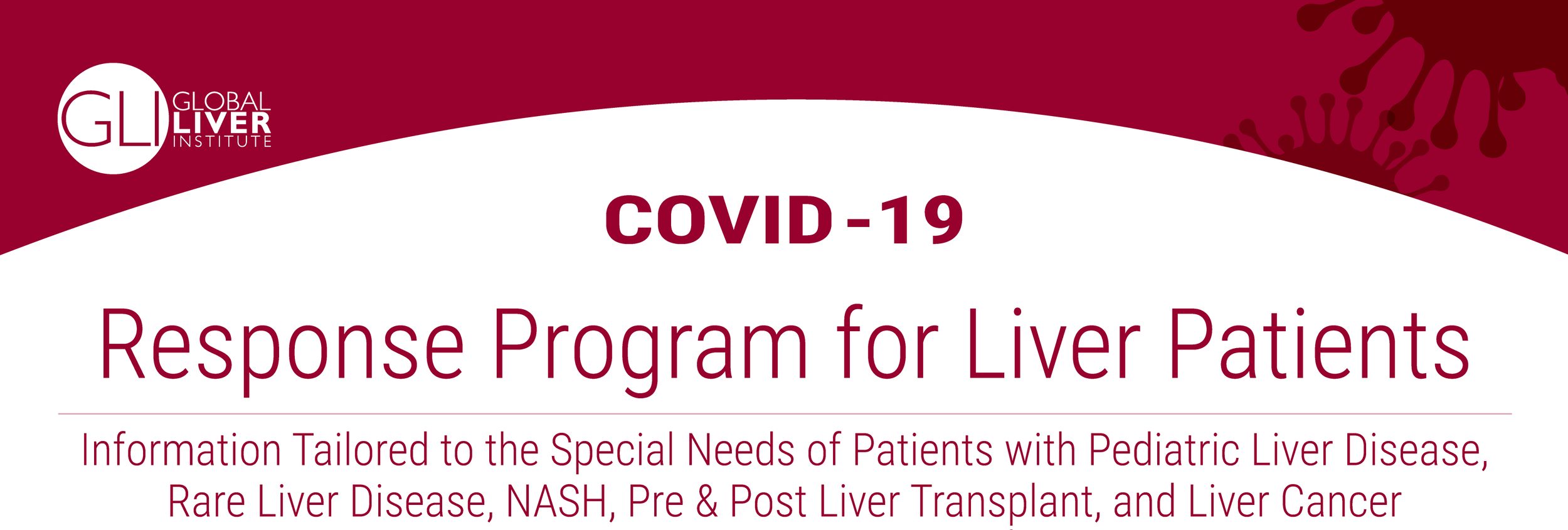
Either by the immunosuppressive nature of our conditions or as an effect of the medications we are taking, liver patients should be considered vulnerable and at high-risk for contracting a COVID-19 infection. Patients should stay home and should not Travel. The evidence continues to be developing around our specific degree of risk and how our immunosuppression affects how severely we develop disease or how it may elevate how rapidly we shed or spread the virus. However, preliminary research shows that COVID-19 causes liver injury, which can make outcomes worse for people who already have liver fibrosis or cirrhosis. The challenge of delivering essential care to liver patients, including performing liver transplants may stress healthcare delivery systems in areas that are experiencing high numbers of COVID-19 patients.
In response, the Global Liver Institute has developed and continues to evolve and expand the following COVID-19 Response Program for Liver Patients
Communications
- Website Resource Page
- FB Live events Wednesday noon EDT
Support
- Dedicated email covid19@globalliver.org for community questions
- Zoom virtual meetings with our Advanced Advocacy Academy (A3) alumni who lead liver organizations and support groups
Advocacy
- Liver Patient COVID-19 Advocacy Agenda. We will continue to work with fellow advocates, local, state, and national governments to ensure that people living with liver disease do not experience unnecessary or discriminatory healthcare or treatment disruptions due to important public health strategies that are being applied globally to mitigate further spread of COVID-19.
Five Recent Updates Important for You
- AASLD Clinical Insights for Hepatology & Transplant Providers During Covid 19 Pandemic
- Launch of a COVID-19 Registry for Liver Patients
- Milken Institute/Faster Cures Treatment and Vaccine Tracker
- FDA and EU Guidance on Clinical Trials
- Advocacy Successes That Have Improved Access to Care
AASLD Clinical Insights for Hepatology & Transplant Providers During Covid 19 Pandemic
The AASLD Clinical Insights for Hepatology & Transplant Providers During the Covid 19 Pandemic released march 23, 2020 answered many of the questions that we have been generating and yielding from patients.
Some highlights for patients:
- It is still unknown if immunosuppressed patients are at greater risk for more severe disease; however post-transplant recipients over 60 years old and immunosuppressed patients are more likely to acquire SARS-CoV-2 infection
- Stable patients should remain on medications and at home; keep up handwashing, space disinfecting, and practice social distancing if out of the home
- Doctors will be unlikely to start you on a new medication
- Medical visits should be limited, ideally done by telehealth
- Lab work and imaging should be done only if necessary
- Non-essential visits, endoscopy, and surgery will be postponed or rescheduled
- If you go into the doctor’s office, expect to be screened with symptom and temperature check (you want temperature below 100.4F) and travel history
- Transplants and Liver cancer treatment should proceed
- Transplant donors will be screened; COVID-19 positive donors will not be transplanted
- For liver disease patients with COVID-19, there are many different protocols that are being tried. Some include reducing immunosuppression and others look for drug-drug interactions
- Those enrolled in clinical trials may see changes such as trials suspended or re-scheduled, or methods of visit changed; e.g. clinic visit changed to mobile or home, IV medication changed to oral; do not expect a new trial to start
Additional information for cancer patients from ASCO
2. Launch of a COVID-19 Registry for Liver Patients
To be able to answer questions specific to liver patients with laboratory confirmed COVID-19, researchers in Europe, joined by researchers in the Americas, have established a registry. The registry seeks to capture pre-cirrhotic patients, immunocompromised liver patients, both compensated and decompensated cirrhotic patients, and those who have already been transplanted. Data from patients in hospital or managed in the community will be captured.
- Europe: https://www.covid-hep.net/
- Americas: SECURE-cirrhosis
3. Milken Institute/Faster Cures Treatment and Vaccine Tracker
There is currently no approved treatment for COVID-19 and no vaccine. Do not fall for scams! However, there are many trials for both treatments and vaccines that have started enrolling patients. Many of the treatment trials involve repurposing drugs approved for other purposes such as malaria. A resource launched 3/23/20 to track these development programs is housed by: Milken Institute’s Faster Cures
4. FDA and EU Guidance on Clinical Trials
Clinical Trials are an important part of healthcare, ensuring that we have treatments for conditions such as PBC and NASH in addition to COVID-19. While many academic labs have been closed as researchers are sent home and NIH is turning its resources to the pandemic, many trials will attempt to continue. FDA has issued this guidance on how to do so.
The European Commission, the European Medicines Agency (EMA) and national Head of Medicines Agencies (HMA) have also issued guidance on how to manage clinical trials during the COVID-19 pandemic.
5. Advocacy Successes That Have Improved Access to Care
Advocates throughout the Liver, GI, and healthcare communities have come together quickly and collaboratively to address myriad issues related to ensuring the safe delivery of COVID-19 and non-COVID-19 healthcare services for liver patients. The key successes have been around securing waivers for provision of telehealth services with reimbursement to providers and having CMS declare that liver transplants are not elective surgeries. See here. During a recent White House Press Conference on March 21st. Admiral Brett P. Giroir, M.D., Assistant Secretary for Health at the U.S. Department of Health and Human Services (HHS), noted that symptomatic individuals who have underlying conditions like chronic liver disease should be prioritized for COVID-19 testing. However, whether individuals can obtain tests at this time depends upon test availability and local circumstances.
GLI Policy Requests
- We must encourage all impacted populations to maximize use of telehealth to limit exposure to the virus.
- We must implement strategies that increase the amount of available personal protective equipment (PPE) for all health care providers. Our health care providers are on the front line of this fight, and they must be properly protected.
- For liver disease patients to follow guidances regarding mitigation strategies, including social distancing, and remain adherent to their treatment all countries must mandate early prescription refills and allow enrollees to obtain the maximum extended day supply of medications.
- All countries must maintain the critical safety net of timely access to immunosuppressive drugs to ensure transplants are not lost due to rejection during this global crisis.
- Liver transplant surgeries must continue to be classified as critical even during this global pandemic.
- We ask that each diverse patient population whether it is geographically, culturally, or based on their disability, be equally cared for during this time of crisis as important efforts are directed towards COVID-19.
- Protections must be put in place for all workers who are sick and quarantined, unable to provide care, experiencing school closures, laid off or are experiencing reduced work hours.
- Unemployment assistance that covers all workers, and paid sick leave are vital during a global pandemic like COVID-19.
- We urge all governments to implement policies that protect the livelihood, and access to care of all impacted by this crisis.
As Transplant Patient-in-Chief This is What I am Doing:
- Staying home: Try explaining social distancing to a Yorkie! With the exception of walking my dogs while maintaining at least 6 feet distance from other people and an anxiety-provoking quick trip for medications that the pharmacy could not ship, I have not left the house in 3 weeks and do not intend to for several more weeks. Even if restrictions are lifted, I would be concerned of a surge as people start to gather again, and would ride that period of time out at home.
- Adjusting my work schedule: I am busier than ever and consider that a privilege, but I realize if I burn out then I am not good for anyone so I have shifted to earlier hours and then a late afternoon where I turn off device notifications, walk the dogs, exercise (Peloton and weights), and meditate.
- Cooking healthy food: I have been stress snacking. So I am refocusing on the healthy soups and stews I have been making and leaving the biscuits and brownies alone so I don’t leave this sequestration 20 lbs. heavier.
- Reaching out to family and friends: It has become an important part of caring for myself and my community to set aside several hours a day to Zoom or FaceTime with elderly relatives, friends, and even other business partners. Who knows, we may end this with stronger relationships than before.
Stay safe, well, and connected.
Sincerely,

Donna R. Cryer
Founder & CEO
Liver Transplant 1994 Johns Hopkins


